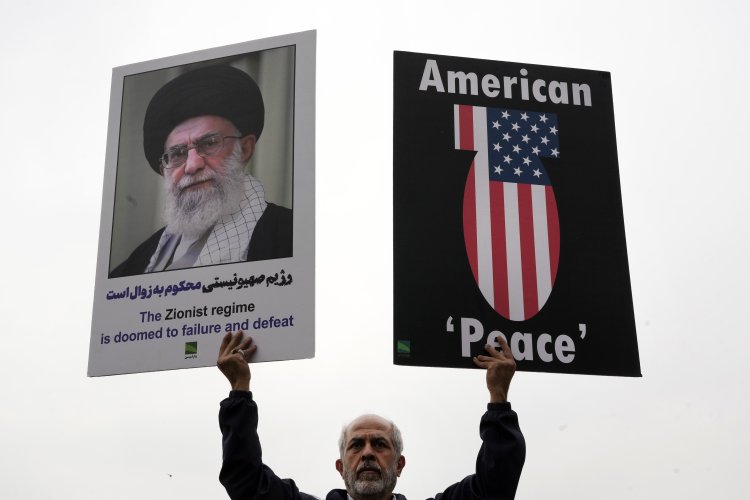The Negotiation Strategy of Iran That the Trump Administration Fails to Understand -- Editorial
Sanctions and 'maximum pressure' have consistently failed to deter the clerical regime from pursuing its nuclear ambitions.

This indicates that, rather than appearing submissive, the Islamic Republic is projecting confidence.
For too long, U.S. officials have deluded themselves regarding the effectiveness of economic sanctions as a deterrent against nuclear ambitions. With the Trump administration's decision to resume negotiations, it is crucial for them to have a nuanced understanding of their adversary, especially regarding the limitations of sanctions in changing Iran’s behavior.
Indeed, sanctions have drained Iran’s finances and led to inflation and rising unemployment. The regime struggles to maintain basic services and has occasionally had to close government offices and schools to manage energy consumption. However, for regime leaders who claim to have divine insight, these economic hardships are a minor inconvenience compared to the goal of cultivating more devout Muslims among the Iranian populace. The Islamic Republic’s preference for proxy warfare, terrorism, and anti-Semitic conspiracy theories illustrates a mindset that is fundamentally different from Western perspectives. While sanctions may inflict economic pain and limit resources, they have not deterred these leaders from pursuing their ideological and strategic goals.
Crucially, sanctions have never caused the clerical regime to abandon its nuclear ambitions. During Trump’s first term, his “maximum pressure” campaign inflicted significant damage on Iran’s economy, yet Tehran did not surrender its nuclear capabilities. To date, discussions of relinquishing its atomic assets seem to have not been entertained among influential figures in the regime.
Similarly, Barack Obama’s 2015 nuclear deal, the Joint Comprehensive Plan of Action, was not solely the result of escalating sanctions. The nuclear dialogue that led to the agreement actually began with European engagement in 2003, spurred by the anxiety surrounding the Iraq War. Obama’s outreach gained traction only after giving a critical concession — recognizing Iran’s "right" to enrich uranium. Another significant concession was permitting Iran to keep a substantial nuclear infrastructure, which could be swiftly revived. Ali Salehi, the MIT-educated nuclear engineer who likely played a key role in Iran’s dual-use import network, favored the Obama agreement because it assured the Islamic Republic a more advanced, well-funded nuclear program that could expand openly. It was primarily the lenient terms of the deal, rather than promised economic relief, that motivated the theocracy to endorse the 2015 accord.
Since the Iran-Iraq War, the Islamic Republic has demonstrated a remarkable resilience, often using temporary setbacks to pursue long-term objectives. The regime is adept at conceding ground when necessary, only to pivot back and reclaim those concessions later.
This pattern is visible domestically as well. Since 2009, the clerical regime has successfully navigated several nationwide protests, many of which were fueled by economic issues and posed serious threats to the regime's stability. Each time, Khamenei and his security apparatus have been ready to suppress dissent but have also offered temporary concessions to maintain control. For example, the mullahs have occasionally relaxed restrictions on women’s visibility, allowing scarves to slip when unrest looms, before reverting to strict enforcement. Internationally, the regime has exhibited similar behavior. Following the U.S. invasions of Afghanistan and Iraq, Tehran adopted a restrained approach, only to subsequently devise methods to attack American interests.
Despite a challenging period, the Trump administration might assume that Tehran is at a disadvantage as negotiations commence. The disintegration of critical components of Tehran’s “axis of resistance” has undoubtedly diminished its regional influence. Its close ally, Syrian dictator Bashar al-Assad, has been significantly weakened, along with the lost territorial connections to Lebanon and the proxy forces that enabled Iran to project power in the Arab world. Last year, Israel displayed its capacity to easily penetrate Iran's aerial defenses, and the mullahs’ missiles, despite substantial investment, proved largely ineffective.
While Trump may have hoped to encounter Iranian leaders weakened in spirit and ready to comply with his demands, Khamenei’s willingness to make tactical concessions does not extend to capitulation under pressure, as he believes this would only embolden adversaries. The cleric also faces pressure from his right-wing base, specifically the Islamic Revolutionary Guards Corps. Historically, the Guards have not been inherently opposed to nuclear talks or trade with the United States; however, they oppose concessions that would be difficult to reverse. Presently, their focus is on rebuilding military capabilities and revitalizing weakened proxy forces. The perceived value of a nuclear weapon as the ultimate deterrent is now higher than ever within their ranks, which is prompting discussions among Iranian officials about the strategic benefits of developing nuclear arms sooner rather than later. The Guards would likely disapprove of any perceived weakness from Khamenei, who has maintained their loyalty by consistently supporting their most fervent members and backing them in their suppression of dissent, even with extreme measures.
Iranian hardliners believe they have deciphered Trump’s approach. They assert that the United States is no longer a formidable power capable of forging alliances or enforcing its conditions on unyielding regimes. Javan, the Revolutionary Guards' newspaper, interprets Trump’s unpredictable behavior and bravado as a façade masking America's underlying weaknesses: “He tries to use his personality in order to create an atmosphere whereby he can achieve dramatic results.”
As momentum in diplomacy builds, Nournews — the spokesperson for Iran’s Supreme National Security Council, which directs all foreign-policy decisions — emphasized: “Countries that have resisted Trump’s trade tariffs have communicated to him that they are not afraid of his threats and can withstand economic pressure. This type of resistance could compel Trump to reconsider his policies, as such pressures and threats may inflict damage on the U.S. economy.”
This indicates that the Islamic Republic is engaging in talks with the Trump administration not due to external coercion, but as a means to safeguard the critical elements of its expanding nuclear apparatus, buoyed by confidence that they can achieve this if the negotiations progress. In the process, the clerical regime may agree to dilute its stockpile of 60 percent-enriched uranium, which is close to weapons-grade, or even limit enrichment to a lower threshold. Such concession would be a notable gesture but would not fundamentally alter the core nature or trajectory of Tehran’s nuclear ambitions. The mullahs understand that safeguarding their newer generation of centrifuges is paramount. These advanced machines can quickly and efficiently enrich uranium to weapons-grade levels and can be concealed in smaller, less detectable facilities. According to the Institute for Science and International Security, these centrifuges are already in operation.
Even a stringent inspection regime would find it excruciatingly difficult to locate these centrifuges without a robust human intelligence network. Placing a nation’s diplomatic efforts and future security on the establishment of such a network within a hostile environment is a precarious strategy. Israel, which has undoubtedly developed a more effective intelligence apparatus within Iran than the U.S. likely possesses, would be cautious about any aggressive maneuvers.
Arms control is a drawn-out process governed by complex technical negotiations between physicists and politicians. Deadlines can slip, and red lines can blur. This framework serves the clerical regime well, providing a buffer for its nuclear initiatives against potential Israeli strikes, even as Israel may reach a political consensus to act against Iran's facilities, despite uncertainties about destroying underground enrichment sites. The clerical regime once feared that Trump might support an Israeli-American assault on its nuclear infrastructure; with talks now in motion, that apprehension appears to be diminishing.
Currently, the mullahs seem to believe they have a grasp on America’s strategy. The question remains: Do we truly understand theirs?
Jane A Parish for TROIB News
Find more stories on Business, Economy and Finance in TROIB business












